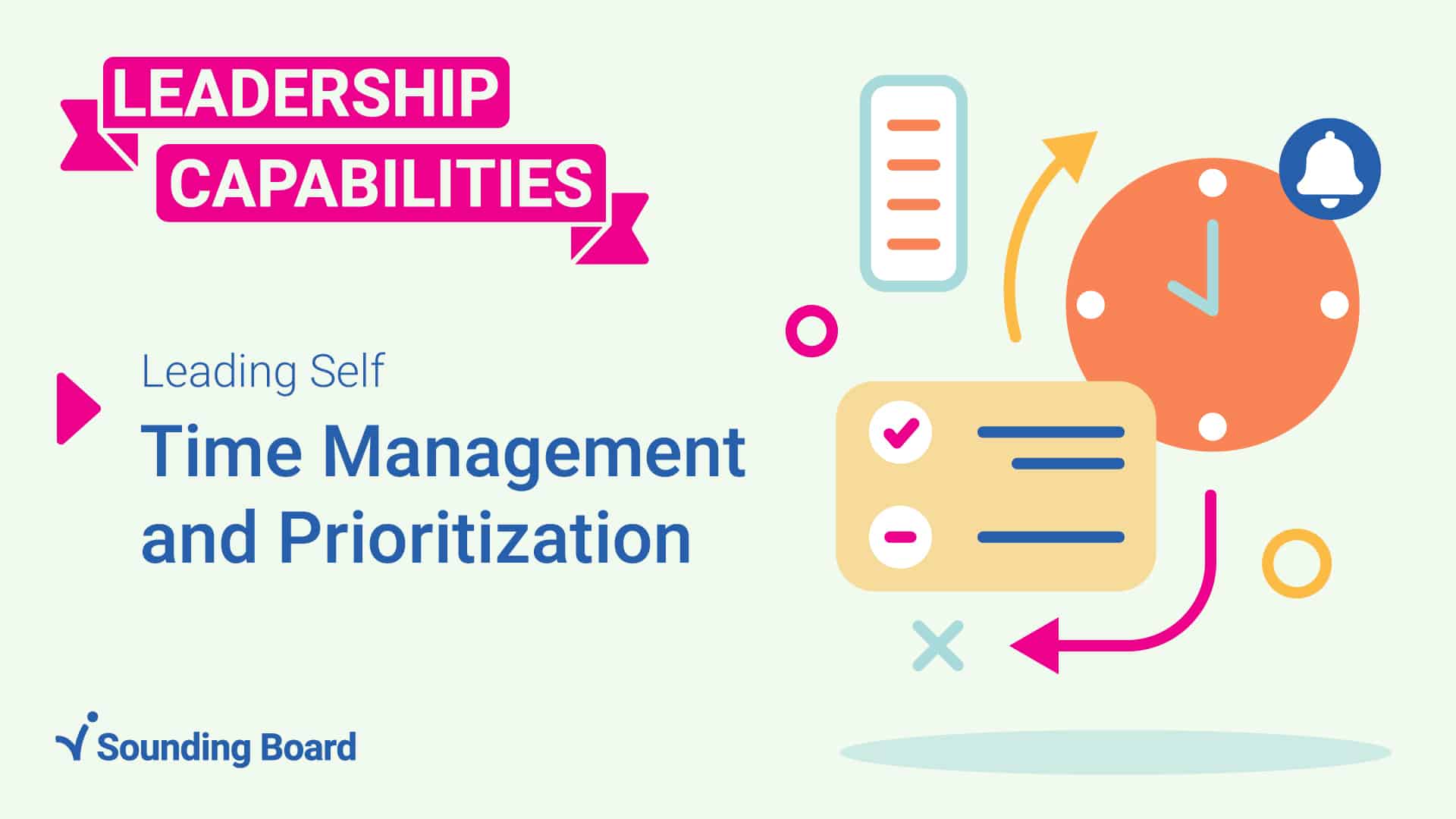This blog is part of a 16-part series focused on what capabilities make a strong leader. Sounding Board has identified 16 leadership capabilities that the strongest leaders possess. These were developed from research-backed leadership theories, leadership competencies used for evaluation from top business schools, and 25+ years of practical coaching application.
One of the greatest challenges new leaders often encounter is learning how to manage their time, prioritize work, and be fully present for their teams. It’s not always a high priority skill for leadership development, but it should be. It has implications for so many things that leaders encounter every day alone, and with their teams.
Time management refers to the process of planning and controlling the amount of time spent on a given task. The goal here is almost always to increase efficiency, effectiveness, and productivity. Effective time management and prioritization allow leaders to assign specific time slots to given tasks based on their importance. Properly prioritizing tasks ensures that they are accomplished based on both importance and urgency. Further, it enables leaders to set aside enough time to guide their team members if they have questions or require feedback.
Attributes in leaders with time management and prioritization skills
If you see leaders with the following skills, they’re likely also good with time management and prioritization:
They plan priorities for self and for the team
Highly effective leaders know that it’s important to make time for themselves and for their teams. Leaders who aren’t proactively planning time to support their teams may allow emails, meeting requests, and other work to consume their days. Consequently, they become consistently unavailable to their team members.
These leaders may appear disconnected or unreliable. Their employees may feel neglected, and can lose morale, lack direction, and detach themselves from the team in a move that mirrors the treatment they’re getting or not getting from their leader. On the other hand, employees whose leaders prioritize connection often feel more valued, and their morale will be higher. In turn, their productivity increases, and so does their loyalty and trust in their leaders.
They balance the tension between daily tasks and strategic action
Failing to plan how to accomplish daily tasks and strategic actions can create tension between short-term and long-term organizational goals. The most productive leaders understand that not aligning their daily tasks with a larger strategic plan can lead to shallow, lackluster results. Successful leaders allot enough time for both daily and future-focused tasks to ensure they accomplish what they need to finish today, and make strides to complete broader, potentially more complex organizational goals that will manifest in a future tomorrow.
They allot time effectively across multiple priorities
Typically, there are different tasks to be completed in an organization each day. Failing to effectively allot sufficient time to complete all of these tasks leads to missed project deadlines. Leaders must be able to prioritize tasks based on how important and how urgent they are. For instance:
- Important and urgent tasks: These should be done right away.
- Urgent but not that important tasks: If possible these should be delegated.
- Important but not that urgent tasks: Leaders should designate a convenient time to complete them.
- Neither important nor urgent tasks: Set these aside to be completed later.
Whenever possible, a productive leader should delegate tasks that may stop them from focusing on larger priorities. Sharing workloads with team members helps leaders find the energy and time to ensure their team members have everything they need and can, therefore, effectively deal with their own responsibilities as well as any clients or customers who also deserve their full attention.
They set time boundaries, and build healthy habits
According to the Harvard Business Review, professionals check their emails every 37 minutes or 15 times a day. Besides email, people also get distracted by notifications from social media, slack, and text alerts. Amid all of this activity, they cannot fully devote their attention to the task at hand.
To curb the habit of checking emails often and losing time to various distractions, leaders can institute rules to limit how often they check notifications, social media, or other applications. The trick here is to set an expectation and communicate what a typical response time will be and how leaders can be reached if something requires immediate attention.
These leadership skills may seem obvious, but they often need to be learned. Further, they need to be practiced, and leaders may need guidance on how best to acquire these capabilities. Leadership coaching can help, and the sooner a leader gets support to build these skills in their career, the more effective they will be.
Start now
Failure to manage your time effectively can have far-reaching effects on your efficiency and productivity. Not sure where to start developing this skill? The team at Sounding Board has you covered. Our network of certified coaches are highly trained in leadership development and can offer personalized solutions to help you and your business thrive.











